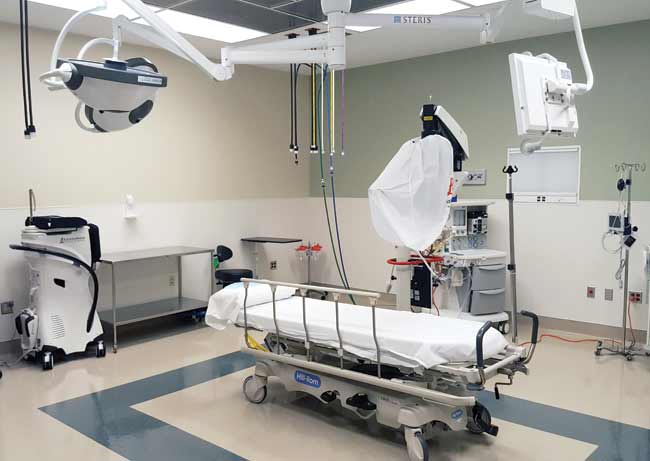The urgent response to the coronavirus outbreak continues as hospitals and surgery centers across the nation are being urged to cancel elective surgeries in order to focus their resources on treating patients infected with COVID-19. Healthcare leaders and national organizations have voiced their support for the postponement of non-essential procedures, but remain committed to ensuring patients have access to medically necessary surgical care.
 EMPTY ROOMS Non-emergent cases are being postponed to free up space for COVID-19 patients.
EMPTY ROOMS Non-emergent cases are being postponed to free up space for COVID-19 patients.
The American College of Surgeons (ACS) issued recommendations for managing surgeries in response to the COVID-19 crisis. "Each hospital, health system and surgeon should thoughtfully review all scheduled elective procedures with a plan to minimize, postpone or cancel electively scheduled operations, endoscopies or other invasive procedures until we have passed the predicted inflection point," writes the ACS. "There are many asymptomatic patients who are unwittingly exposing other inpatients, outpatients and healthcare providers to the risk of contracting COVID-19."
Surgeon General VADM Jerome Adams, MD, MPH, tweeted that hospitals and healthcare systems should consider stopping elective procedures until efforts to flatten the infection curve begin to gain traction. He says each elective surgery brings possible coronavirus into facilities, pulls from stockpiles of personal protective equipment and taxes personnel who may be needed for response efforts.
The Ambulatory Surgery Center Association (ASCA) on Wednesday recommended the postponement of all outpatient procedures until after the pandemic if the delay doesn't pose a safety risk to the patient. "The health and safety of patients, along with preventing the spread of COVID-19, must be our highest priority," says ASCA in a statement. "We concur with the American College of Surgeons that the risk to the patient should include an aggregate assessment of the real risk of proceeding and the real risk of delay, including the expectation that a delay of 6 to 8 weeks or more may be required to emerge from an environment in which COVID-19 is less prevalent."
ASCA made the recommendations in response to government guidance that hospitals and ambulatory surgery centers postpone elective surgeries during the COVID-19 pandemic. "ASCA consulted with clinical leaders to solicit recommendations on how and when facilities should proceed with cases that, for clinical reasons, should not be postponed," says the statement. "A surgery may be deemed urgent and necessary if the treating physician decides that a months-long delay would increase the likelihood of significantly worse morbidity or prognosis for the patient."
According to ASCA, surgeries that could proceed include those to treat acute infection, acute trauma, potential malignancy, uncontrollable pain that would otherwise require a hospital admission or a condition where prognosis would significantly worsen with a delay in treatment. Physicians should also consider the potential of post-op complications that could place stress on hospitals that may lack capacity for transfers, according to the ASCA, which suggests facilities reach out to local hospitals to establish a line of communication that ensures coordination in managing care during the pandemic.
"The point of our guidance is doing right by our patients and right by the country in ensuring ASCs are providing care to only the cases that physicians deem necessary," says ASCA CEO Bill Prentice. "As events change, we'll provide additional guidance about how ambulatory surgery centers may need to adapt to assist the broader healthcare system in responding to the pandemic."
Monticello Community Surgery Center in Charlottesville Va., will stop performing elective procedures based on ASCA's recommendations, according to Andy Poole, the facility's CEO. Boston Out-Patient Surgical Suites in Waltham, Mass., is shutting down for all but emergent cases, based on an order from the Massachusetts Department of Health, according to Administrator Gregory P. DeConciliis, PA-C, CASC. He said the order applies to all outpatient surgery centers in the state. The end date of the forced closures is uncertain, according to Mr. DeConciliis.
"We're basically operating like an emergency room right now," says Mr. DeConciliis. "For the most part, we're shut down. The closures could be (economically) catastrophic for some surgery centers. I don't know if all of them will survive this."
Joe Paone and Adam Taylor.svg?sfvrsn=be606e78_3)
.svg?sfvrsn=56b2f850_5)